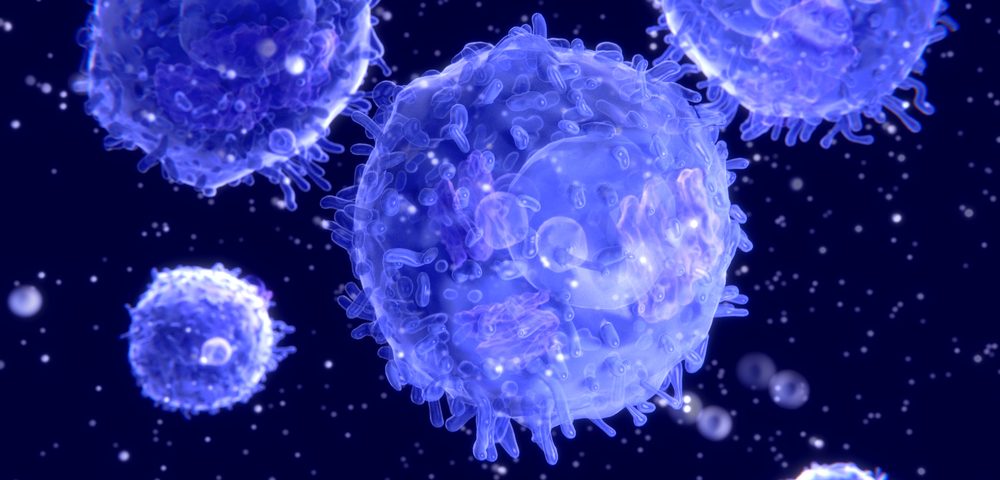TG Therapeutics‘ umbralisib (TGR-1202), an inhibitor of the PI3K delta protein, has shown promising efficacy and safety in patients with relapsed or refractory marginal zone lymphoma, reducing cancer volume in more than half of patients in a Phase 2b trial.
Findings from the ongoing trial — called UNITY-NHL (NCT02793583) — were presented at the American Association for Cancer Research (AACR) Annual Meeting 2019, March 29–April 3 in Atlanta, Georgia.
The study, “Umbralisib monotherapy demonstrates efficacy and safety in patients with relapsed/refractory marginal zone lymphoma: A multicenter, open-label, registration directed Phase II study,” was presented by study co-lead Nathan Fowler, MD, associate professor in the Department of Lymphoma & Myeloma at The University of Texas MD Anderson Cancer Center.
Earlier findings from this trial have already led the U.S. Food and Drug Administration to grant the designation of Breakthrough Therapy to umbralisib for the treatment of adults with marginal zone lymphoma who did not respond to at least one CD20 inhibitor.
Marginal zone lymphoma is a low-grade (cancer cells that look like normal cells) form of non-Hodgkin’s lymphoma responsible for approximately 6% of all lymphoma cases. Despite being treatable, many patients eventually relapse, at which point very few therapy options remain.
Umbralisib is an investigational, orally administered, new-generation inhibitor of PI3K delta, a family of proteins that play important roles in the growth and survival of immune B-cells, which are involved in many different types of lymphoma, including marginal zone lymphoma.
“Umbralisib is part of a new class of drugs that are quite active in low-grade lymphomas,” Fowler said in a press release. “These PI3K inhibitors have shown activity across a spectrum of low-grade lymphomas and are effective in shutting down some of the key signaling that is occurring with MZL.”
UNITY-NHL is testing umbralisib, alone or in combination with other treatments, in non-Hodgkin’s lymphoma patients who either failed to respond to at least one prior line of therapy, relapsed after that therapy, and are not candidates for high-dose chemotherapy and a stem cell transplant.
Safety and efficacy data presented at the AACR included data from the first 38 patients receiving umbralisib alone, who had at least six months of follow-up. All study participants were treated with 800 mg of umbralisib, administered orally once a day, until disease progression or unacceptable toxicity.
The trial’s primary endpoint was to assess patients’ overall response rate, or the percentage of patients whose tumors decreased. Secondary endpoints included the duration of response, time patients lived without signs of disease worsening, and safety analyses.
The 38 study participants had a median age of 67 years, and were followed for a median of 9.6 months. They included seven patients (18%) who previously had been treated with the CD20 antibody Rituxan (rituximab) only, and 26 (68%) who had been treated with at least one CD20-containing chemotherapy regimen.
Results showed that 55% of the patients attained a response to treatment, including 10% complete responses (no signs of cancer), and an additional 29% achieved stable disease. In total, 84% had some sort of benefit from umbralisib, and 91% experienced a tumor reduction in at least one post-therapy assessment.
In addition, findings indicated that 71% of patients remained alive and without signs of disease progression for at least one year after treatment.
“This study is ongoing and we have yet to reach a median duration of response, although most of the patients who received the drug remain in remission,” Fowler said.
The most common adverse events reported included diarrhea (45%), nausea (29%), fatigue (26%), headaches (26%), cough (24%), and lack of appetite (21%). A total of 16 patients (42%) interrupted treatment, including 8% because of treatment-related side effects. The remaining 22 patients (58%) are still receiving treatment.
Based on these findings and the continuous effort put into development of new therapies for rare types of lymphomas, Fowler is confident these patients will be met with better treatment options in the future.
“At MD Anderson, we have been fortunate to lead the development of several of these targeted drugs in lymphoma,” Fowler said. “Phase I studies conducted here with PI3K and BTK inhibitors has now resulted in Food and Drug Administration approval of many of these drugs across several types of lymphoma.”


